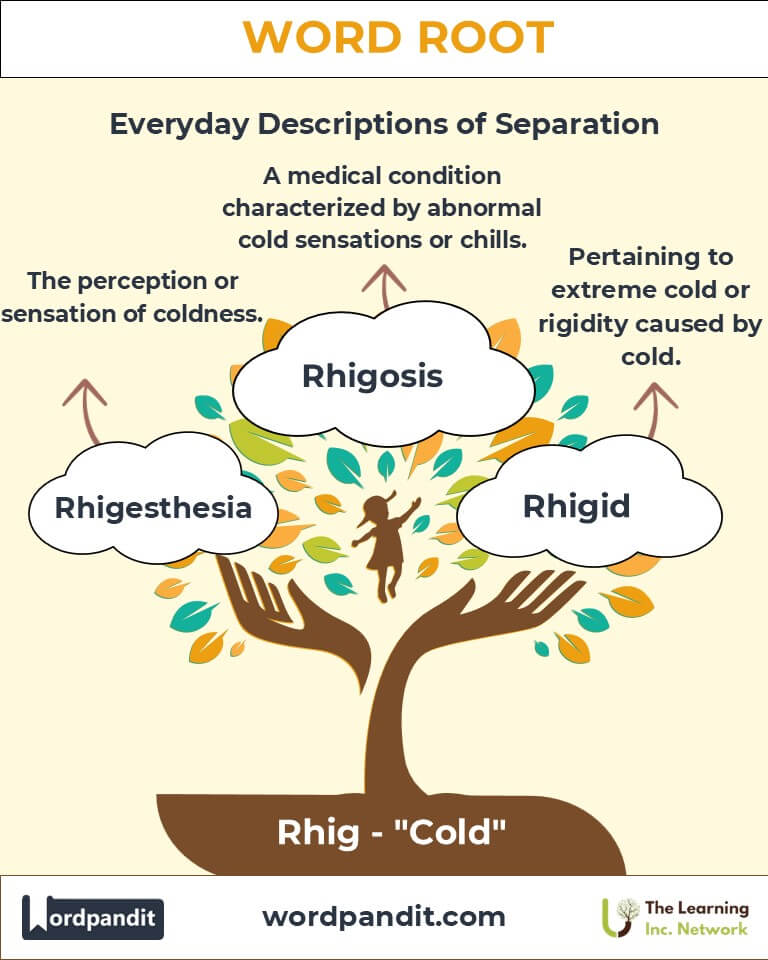Rhig: The Cool Root of Cold Phenomena and Reactions
Discover the unique world of the word root "Rhig," derived from Greek, meaning "cold." From medical terms like "rhigosis" to psychological expressions like "rhigophobia," this root encapsulates our physiological and emotional responses to cold.

Table of Contents
- Introduction: The Essence of "Rhig"
- Etymology and Historical Journey
- Mnemonic: Unlocking the Power of Rhig
- Common Rhig-Related Terms
- Rhig Through Time
- Rhig in Specialized Fields
- Illustrative Story: Rhig in Action
- Cultural Significance of the Rhig Root
- The Rhig Family Tree
- FAQs about the Rhig Word Root
- Test Your Knowledge: Rhig Mastery Quiz
- Conclusion: The Living Legacy of Rhig
Introduction: The Essence of "Rhig"
When winter chills seep into your bones or a shiver travels down your spine, the root "Rhig" captures the very essence of cold. Pronounced as "rig," this Greek-origin root forms the foundation of words that describe cold sensations and related phenomena. From physical reactions to emotional responses, the root "Rhig" is central to understanding how coldness interacts with the human experience.

Etymology and Historical Journey
The root "Rhig" comes from the Greek word rhigos (ῥῖγος), meaning "cold" or "chill." In ancient Greek medical texts, this term often described physical shivering or symptoms associated with cold-induced reactions. Over time, "Rhig" found its way into English medical and psychological vocabulary, enriching descriptions of cold phenomena both literal and metaphorical.
Mnemonic: Unlocking the Power of Rhig
Mnemonic Device: "Rhig gives you the chills—whether it’s a cold breeze or a fearful freeze."
Picture a frosty morning where every step crunches the icy ground beneath your feet, perfectly embodying the root "Rhig" in all its chill-inducing glory.
Common Rhig-Related Terms
- Rhigosis (rig-OH-sis): A medical condition characterized by abnormal cold sensations or chills.
Example: “The patient reported episodes of rhigosis, especially during cold weather.” - Rhigophobia (rig-oh-FOH-bee-uh): An irrational fear of cold or becoming cold.
Example: “Her rhigophobia made her avoid outdoor winter activities entirely.” - Rhigosity (rig-AH-suh-tee): A rare term describing the state or quality of being cold or frosty.
Example: “The rhigosity of the air left everyone bundled in heavy coats.” - Rhigesthesia (rig-es-THEE-zhuh): The perception or sensation of coldness.
Example: “Altered rhigesthesia can indicate nerve damage or sensory disorders.” - Rhigid (RIG-id): Pertaining to extreme cold or rigidity caused by cold.
Example: “The rhigid landscape sparkled under the icy moonlight.”
Rhig Through Time
- Ancient Medical Use: Early Greek physicians like Hippocrates used "rhigos" to describe symptoms of feverish chills during illness.
- Modern Psychological Context: Terms like "rhigophobia" evolved as understanding of mental health expanded, illustrating the emotional impact of cold.
Rhig in Specialized Fields
- Medicine: Rhigosis describes cold-induced discomfort often linked to circulatory issues.
- Psychology: Rhigophobia refers to an extreme and irrational aversion to cold environments or sensations.
- Environmental Science: Rhigid ecosystems describe areas dominated by freezing conditions, like the Arctic tundra.
Illustrative Story: Rhig in Action
Lena, an avid mountaineer, loved the thrill of scaling icy peaks. However, during one expedition, she developed intense rhigosis in her fingers, forcing her to retreat to base camp. Meanwhile, her companion Jake struggled with rhigophobia, refusing to leave the heated tent. Together, they confronted their challenges—Jake, by seeking therapy, and Lena, by using advanced warming gear for future climbs. Their story shows how "Rhig" words shape both physical and emotional narratives about cold.
Cultural Significance of the Rhig Root
Cold has long symbolized not just temperature but also emotional states like isolation or fear. In literature, frosty imagery often conveys detachment or death, resonating with the root "Rhig." Additionally, cultural attitudes toward cold climates—viewed as either harsh adversaries or serene retreats—underscore its duality.

The Rhig Family Tree
The root "Rhig" connects with several related linguistic elements:
- Cryo- (Greek: "frozen, icy"):
- Cryotherapy: Treatment involving cold temperatures.
- Frig- (Latin: "cold"):
- Frigid: Extremely cold.
- Gel- (Latin: "freeze"):
- Gelid: Icy or frosty.

FAQs About the Rhig Word Root
Q: What does "Rhig" mean?
A: The root "Rhig" means "cold," derived from the Greek word "rhigos." It describes cold sensations and phenomena, appearing in both medical and psychological contexts.
Q: What is rhigosis?
A: Rhigosis refers to abnormal sensations of cold or chills, often without a clear external cause. It may indicate circulatory or neurological issues and is studied in medical fields.
Q: What is rhigophobia?
A: Rhigophobia is an irrational fear of cold or becoming cold. This rare psychological condition can impact daily life, as individuals avoid cold environments, foods, or activities.
Q: How is "Rhig" different from "Cryo"?
A: While both "Rhig" and "Cryo" relate to cold, "Rhig" emphasizes sensations and reactions, such as shivering or chills, while "Cryo" is more scientific, used in terms like cryotherapy for extreme freezing processes.
Q: What causes rhigophobia?
A: Rhigophobia often stems from traumatic experiences with cold, such as frostbite or near-hypothermia. It may also be linked to broader anxiety disorders or irrational fears.
Test Your Knowledge: Rhig Word Root Quiz
1. What does "Rhig" mean?
2. What does rhigophobia describe?
3. Which field uses the term rhigosis?
4. What does rhigesthesia describe?
5. What does rhigid describe?
Conclusion: The Living Legacy of Rhig
The root "Rhig" captures the profound influence of cold, from physical sensations to emotional and cultural interpretations. By exploring this root, we gain a richer understanding of how cold shapes human experiences and language alike. Let "Rhig" inspire you to embrace both the chill of knowledge and the warmth of discovery.














